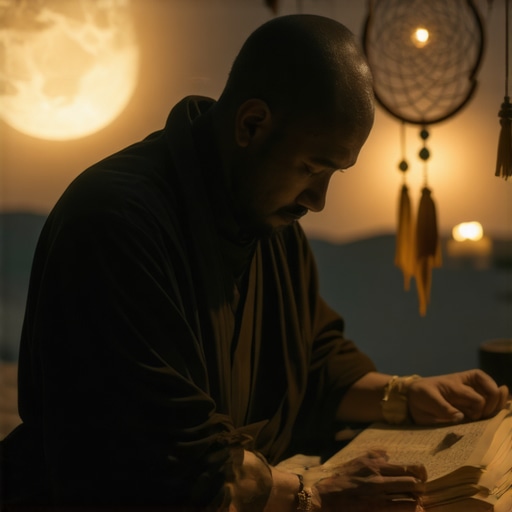My Personal Encounter with the Mystical World of Dreams in Islam
Ever since I was young, I found myself captivated by the mysterious realm of dreams. As I grew older and delved into Islamic teachings, I realized that dreams are not just fleeting visions but sacred messages from Allah. This realization transformed my understanding of my nightly visions, turning them into sources of divine guidance and spiritual growth.
Understanding Dreams in Islam: More Than Just Sleep
In Islam, dreams hold significant spiritual value. They are considered one of the ways Allah communicates with His servants. I learned that dreams can be categorized into true dreams, which contain divine messages, and false dreams, which are merely thoughts or shaytanic whispers. Recognizing the difference is crucial for understanding the sacred significance behind each vision.
My Journey to Decipher Sacred Symbols in Dreams
One of my most memorable dreams involved a radiant snake, which initially frightened me. However, after researching Islamic interpretations, I discovered that snakes often symbolize hidden dangers or spiritual warnings. Exploring trusted sources like Islamic dream dictionaries helped me unlock the deep meanings behind such symbols. I found that understanding these signs requires both faith and knowledge, often guided by teachings from scholars like Ibn al-Qayyim.
What Does Dreaming of Prophets or Sacred Figures Truly Mean?
Dreams about prophets, like Prophet Musa or Prophet Isa, are especially profound. I once dreamt of Prophet Musa, which left me feeling inspired and spiritually uplifted. Such dreams are believed to be divine messages, emphasizing the importance of righteousness and faith. According to Islamic scholars, these visions serve as divine encouragement to strengthen our faith and follow the righteous path (source).
Why Are Sacred Dreams So Important in Our Spiritual Journey?
In my experience, sacred dreams act as a spiritual compass, guiding us through life’s challenges and uncertainties. They remind us of our divine purpose and the unseen world that influences our lives. Recognizing and interpreting these visions requires sincerity, patience, and knowledge. If you’re interested in exploring this deeper, I highly recommend studying reputable Islamic dream interpretation guides and consulting knowledgeable scholars.
If you’ve had a meaningful dream or want to share your experiences with sacred visions, I invite you to leave a comment below. Connecting with others who seek divine guidance enriches our spiritual journey and helps us understand the sacred language of dreams better.
Decoding Sacred Symbols in Islamic Dreams: A Pathway to Divine Guidance
Dreams in Islam are often rich with symbolism—each image, object, or scene can carry profound spiritual significance. Recognizing these sacred symbols requires a deep understanding rooted in Islamic teachings and scholarly interpretations. For instance, seeing water in a dream may symbolize spiritual purification or divine mercy, while encountering a snake might represent hidden dangers or warnings from Allah. Exploring trusted sources like Islamic dream dictionaries can facilitate accurate interpretations, but it’s essential to approach these symbols with sincerity and faith.
How Do Sacred Dreams Serve as Divine Messages?
Sacred dreams often act as divine messages, guiding believers towards righteousness or warning against potential harm. For example, dreams of Prophet Musa (Moses) or Prophet Isa (Jesus) are considered sacred and may serve as divine encouragement to strengthen faith or pursue righteous actions (source). Such visions are believed to contain divine wisdom, often conveying divine approval, warnings, or guidance tailored to the dreamer’s spiritual journey. Recognizing these divine messages requires an understanding of Islamic symbolism and the context of the dream, often guided by scholarly wisdom.
What Is the Role of Faith and Knowledge in Interpreting Sacred Dreams?
Interpreting sacred dreams is not merely about understanding symbols but also about cultivating sincerity and trust in Allah’s wisdom. Knowledge from authentic sources like Tafsir al-Ahlam and consultation with knowledgeable scholars are invaluable. These interpretations are nuanced, often requiring a holistic view that considers the dreamer’s spiritual state, life circumstances, and Islamic teachings. For example, a dream involving a significant object like a key might symbolize divine knowledge or access to spiritual truths, but only within the context of the dreamer’s personal spiritual journey.
Practical Steps to Recognize and Respond to Sacred Dreams
Developing a keen awareness of dreams involves sincere supplication (dua), prayer, and reflection upon the meanings. It’s advisable to seek refuge from Shaytan before sleeping and to remember Allah, which can help protect the dream from shaytanic whispers. When experiencing a meaningful dream, record it diligently and seek guidance from scholars or trusted Islamic dream interpretation resources. Engaging with the community, sharing experiences, and asking for divine guidance can deepen one’s understanding of sacred symbols and messages.
If you’ve encountered a dream that feels spiritually significant, I encourage you to explore further by consulting reputable sources such as Ibn al-Qayyim’s teachings or reaching out to knowledgeable scholars through our contact page. Sharing your experiences can also foster a supportive community where understanding and divine wisdom flourish. Remember, every sacred dream is an opportunity to strengthen your faith and align more closely with Allah’s divine guidance.
Beyond the Surface: Personal Encounters with the Depths of Sacred Dreams in Islam
My journey into understanding dreams has always been a deeply personal voyage, one that has evolved from simple curiosity to a profound spiritual practice. I remember nights when a dream about a luminous river would leave me contemplating the divine mercy that flows endlessly from Allah. Such dreams, as I have come to realize, are not mere illusions but sacred whispers that call us to reflect on our inner selves and our relationship with the Creator.
Deciphering the Subtle Nuances of Dream Symbols in Islamic Wisdom
One of the most enriching aspects of my exploration has been studying the nuanced symbolism embedded in Islamic dreams. For instance, encountering a specific color, such as green, can carry layers of meaning—signifying spiritual growth, divine favor, or even the promise of blessings. These interpretations, rooted in scholarly works like dream dictionaries, require not only knowledge but also a sincere heart to grasp their true significance. Every symbol beckons us to look inward and seek Allah’s guidance with humility and patience.
How Do Sacred Dreams Challenge Our Perception of Reality and the Unseen?
In my personal reflections, sacred dreams serve as a bridge between the tangible world and the unseen realm that Muslims believe exists beyond our physical senses. These visions often challenge my perception of reality, reminding me that there is more to life than what meets the eye. They reinforce the Islamic worldview that divine messages can come in various forms, urging us to remain vigilant and receptive to Allah’s signs. For example, a dream about Prophet Musa (peace be upon him) might symbolize divine encouragement to pursue righteousness, as discussed in visions of prophets.
What Are the Practical Steps to Deepen Our Connection with Sacred Dreams?
Practicing sincere supplication before sleep, engaging in dhikr, and seeking refuge from shaytan are essential steps to protect and enhance our dream experiences. Keeping a dream journal allows us to revisit and interpret these visions over time, uncovering patterns and messages that might otherwise be overlooked. Most importantly, consulting knowledgeable scholars or trusted Islamic resources, such as Ibn al-Qayyim’s teachings, can provide deeper clarity and insight.
My encouragement to all on this spiritual path is to approach sacred dreams with sincerity and a genuine desire to seek Allah’s guidance. Sharing your experiences in a community of believers can enrich your understanding, fostering a collective awareness of divine messages that transcend individual perception. Remember, every sacred dream is an invitation from Allah to grow closer to Him and to recognize the signs He continuously sends our way.
Exploring the Layers of Divine Guidance Through Sacred Symbols
Dreams are often replete with symbols—each carrying a layered meaning that requires careful discernment. For example, seeing water can symbolize purification, divine mercy, or even spiritual renewal, depending on the context. Delving into trusted sources like Islamic dream dictionaries helps illuminate these symbols, but the key lies in approaching them with faith and an open heart. Only then can we truly unlock the divine wisdom embedded within our visions.
Final Reflection: The Sacred Call to Inner Transformation
In my ongoing quest, I’ve come to see that sacred dreams are more than messages—they are opportunities for inner transformation. They challenge us to purify our Nafs, strengthen our Iman, and align our actions with the divine will. Every dream carries an invitation to reflect, repent, and renew our commitment to Allah’s path. As we continue to seek understanding, let us remember that true insight arises from sincerity, patience, and trust in Allah’s wisdom. If you have experienced a dream that touched your soul or sparked your curiosity, I invite you to share your story in the comments. Your journey may inspire others and deepen our collective appreciation for the divine language that dreams embody.
Deciphering the Sacred Language of Dreams: An Expert’s Personal Journey
As I advanced in my understanding of Islamic dream interpretation, I encountered a recurring theme: dreams are not merely personal experiences but profound divine dialogues. This realization prompted me to develop a systematic approach, blending scholarly insights with intuitive reflection. I discovered that dreams involving symbols like the loss of teeth or visions of prophets require careful contextual analysis, considering both the dreamer’s spiritual state and the broader Islamic symbolism.
The Nuanced Spectrum of Dream Symbols and Their Higher Meanings
My exploration revealed that symbols such as water, fire, or animals often carry multiple layers of meaning, depending on their presentation and the dreamer’s circumstances. For example, water might symbolize divine mercy or spiritual cleansing, but in different contexts, it could also signify emotional turbulence or divine test. This nuanced understanding aligns with scholarly perspectives like those of Ibn al-Qayyim, who emphasized the importance of sincerity and knowledge in interpreting dreams (source).
How Do Sacred Dreams Challenge Our Perception of Reality and the Unseen?
In my personal reflections, sacred dreams serve as a bridge connecting the tangible world with the unseen realm Allah references throughout the Quran. These visions often challenge my perception, reinforcing the Islamic worldview that divine signs transcend physical senses. A dream about Prophet Musa or angels, for instance, acts as a reminder of Allah’s omnipresence and the ongoing divine communication with His chosen servants. Recognizing these messages demands a heart rooted in faith and a mind open to divine mysteries.
What Advanced Techniques Can Enhance Our Capacity to Recognize Divine Messages in Dreams?
To deepen my connection with sacred dreams, I employ advanced spiritual practices such as meticulous dream journaling, seeking constant remembrance (dhikr), and performing specific supplications before sleep. Consulting authentic sources like Ibn al-Qayyim’s teachings provides invaluable insights into the complex symbolism of dreams. These methods not only protect against shaytanic deception but also cultivate an environment where divine messages can manifest more clearly, guiding us toward inner purification and spiritual elevation.
If you are eager to explore the depths of your dreams and unlock divine secrets, I invite you to engage with expert resources and share your experiences. Your journey of understanding sacred dreams can be a source of inspiration and spiritual awakening for others seeking similar divine guidance.
Things I Wish I Knew Earlier (or You Might Find Surprising)
1. The Power of Sincerity in Dream Interpretation
One thing I wish I understood sooner is how crucial sincerity and purity of heart are when seeking divine guidance through dreams. Early on, I often dismissed dreams as mere illusions, but I realized that approaching them with genuine faith transforms the experience into a sacred dialogue with Allah. This shift made my interpretations more meaningful and spiritually enriching.
2. The Subtlety of Symbols and Their Context
Dream symbols are not always straightforward. For instance, seeing water can mean cleansing or mercy, but the context changes everything. Paying attention to the details and my emotional state during the dream helped me decode messages more accurately, aligning with scholarly advice on the importance of context in dream interpretation.
3. The Significance of Repeated Dreams
Repeated dreams often indicate divine emphasis. When I kept seeing a luminous river, I sensed a call to reflect on divine mercy and my spiritual state. Recognizing patterns in dreams can be a powerful way to connect with Allah’s messages, encouraging me to act or reflect more deeply.
4. Dreams as a Reflection of Inner State
Over time, I noticed that my dreams often mirror my inner spiritual condition. Feeling anxious or distant from Allah sometimes manifests as disturbing visions, reminding me to nurture my faith and inner peace. This awareness helped me see dreams as a mirror for self-improvement.
5. The Role of Supplication and Rituals Before Sleep
Engaging in dhikr, prayer, and seeking refuge before sleeping significantly improved my dream experiences. It created a protective environment where divine messages could be received clearly, reinforcing the importance of spiritual preparation for meaningful dreams.
6. The Value of Keeping a Dream Journal
Writing down dreams immediately upon waking preserved their details and helped me track recurring motifs. Over time, this practice revealed deeper meanings and strengthened my connection with Allah’s guidance through dreams.
Resources I’ve Come to Trust Over Time
- Ibn al-Qayyim’s teachings: His insights on dreams are profound and rooted in authentic Islamic scholarship. I highly recommend exploring his works to deepen understanding.
- Tafsir al-Ahlam: A comprehensive guide that helped me interpret symbols accurately and with faith. It’s a valuable resource for anyone serious about dream interpretation.
- Islamic Dream Dictionaries online: Trusted sources like Islamskisanovnik.net offer nuanced meanings that complement scholarly texts and are easy to access.
Parting Thoughts from My Perspective
Reflecting on my journey with sacred dreams in Islam, I realize they are divine whispers guiding us toward inner transformation and spiritual growth. Dreams are not just personal experiences but sacred messages that require sincerity, patience, and knowledge to interpret correctly. Embracing this understanding has enriched my faith and brought me closer to Allah’s divine wisdom. If this resonated with you, I’d love to hear your thoughts or experiences. Sharing our journeys can inspire others and deepen our collective connection with the unseen world of divine messages.



